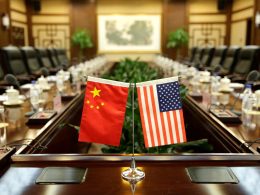Investment Opportunities and Challenges

Investment in infrastructure is a crucial element in boosting economic growth prospects in Africa. The continent’s vast potential is increasingly recognized by global investors, and infrastructure development is at the heart of this potential. Improved transportation networks, energy supply, and communication systems can significantly enhance productivity and facilitate the efficient movement of goods and services. For instance, the construction of new roads, railways, and ports can reduce transportation costs, making African markets more competitive.
Additionally, investments in energy infrastructure can address the chronic power shortages that hinder industrial growth. By providing reliable electricity, businesses can operate more efficiently, and new enterprises can emerge, driving economic expansion. Therefore, investment in infrastructure is not merely about building physical structures; it is about laying the foundation for sustainable economic growth and development across the continent.
Significant Challenge
However, political instability remains a significant challenge to economic growth prospects in Africa. Political unrest, corruption, and governance issues can deter potential investors and disrupt economic activities. For example, countries experiencing frequent changes in government or civil unrest may struggle to attract long-term investments, as investors seek stable environments to safeguard their capital.
Moreover, political instability can lead to inconsistent economic policies, creating uncertainty that hampers business planning and growth. Addressing these challenges requires concerted efforts to promote good governance, transparency, and political stability. By creating a conducive environment for investment, African nations can unlock their economic potential and attract the necessary capital to drive growth.
Technological Advancements and Innovation

Technological advancements are a driving force behind the economic growth prospects in Africa. The rapid adoption of digital technologies, such as mobile banking, e-commerce, and telecommunication, has revolutionized various sectors, making them more efficient and accessible. For instance, mobile banking platforms have enabled millions of Africans to access financial services, promoting financial inclusion and economic participation.
E-commerce
E-commerce platforms have opened new markets for businesses, allowing them to reach customers beyond their immediate geographic locations. Furthermore, advancements in telecommunication have improved connectivity, facilitating communication and information exchange. These technological developments are not only enhancing productivity but also creating new opportunities for innovation and entrepreneurship. As technology continues to evolve, it will play an increasingly vital role in shaping Africa’s economic future.
Innovation is another critical factor boosting emerging markets insights for Africa’s economic future. African entrepreneurs and businesses are leveraging innovative solutions to address local challenges and create new opportunities. For example, in the agricultural sector, innovations such as precision farming and drone technology are improving crop yields and reducing waste.
Healthcare Sector
In the healthcare sector, telemedicine and mobile health applications are expanding access to medical services, particularly in remote areas. These innovations are not only improving the quality of life for Africans but also driving economic growth by creating new industries and job opportunities. By fostering a culture of innovation and supporting entrepreneurial initiatives, Africa can unlock its full economic potential and position itself as a leader in the global economy.
Infrastructure Development and Urbanization
Infrastructure development is a key driver of economic growth prospects in Africa. The continent’s infrastructure deficit has long been a barrier to economic development, but recent efforts to address this gap are yielding positive results. Investments in transportation, energy, and communication infrastructure are enhancing connectivity and enabling more efficient economic activities.
For example, the construction of new highways and railways is improving access to markets and reducing transportation costs. Upgrading energy infrastructure is providing reliable electricity, which is essential for industrial growth and business operations. Additionally, expanding communication networks is facilitating information exchange and boosting productivity.
Infrastructure Developments
These infrastructure developments are not only improving the quality of life for Africans but also creating a more conducive environment for economic growth. By continuing to invest in infrastructure, African nations can accelerate their development and achieve sustainable economic growth.
Economic Growth
Urbanization is another significant factor driving economic growth prospects in Africa’s emerging markets. As more people move to cities in search of better opportunities, urban areas are becoming hubs of economic activity and innovation. Urbanization is associated with increased demand for goods and services, which drives business growth and job creation. Moreover, cities provide a conducive environment for innovation and entrepreneurship, as they offer access to resources, markets, and networks.
For instance, urban centers are often home to universities, research institutions, and business incubators, which foster collaboration and the exchange of ideas. By harnessing the potential of urbanization, African nations can stimulate economic growth and development. However, managing urbanization effectively requires careful planning and investment in infrastructure, housing, and public services to ensure that cities remain livable and inclusive.
Trade Policies and Regional Integration
Trade policies play a crucial role in shaping economic growth prospects in Africa. By creating a favorable trade environment, African nations can attract investment, boost exports, and stimulate economic growth. For example, policies that reduce trade barriers, such as tariffs and quotas, can enhance market access and competitiveness. Additionally, trade agreements with other countries and regions can open new markets for African products and services.
Implementing effective trade policies requires a comprehensive approach that considers the needs and interests of various stakeholders, including businesses, consumers, and government agencies. By adopting trade policies that promote economic integration and cooperation, African nations can create a more dynamic and resilient economy.
Regional Integration
Regional integration is another important factor enhancing Africa’s economic growth prospects. By fostering closer economic ties between neighboring countries, regional integration can create larger and more efficient markets, attract investment, and promote economic development. For example, regional economic communities, such as the African Union and the East African Community, are working to harmonize trade policies, reduce trade barriers, and facilitate the free movement of goods, services, and people.
These efforts are creating a more integrated and competitive regional economy, which can drive economic growth and development. Additionally, regional integration can enhance infrastructure development, as countries collaborate on cross-border projects, such as transportation corridors and energy grids. By promoting regional integration, African nations can unlock new opportunities for economic growth and development.
Human Capital and Education Initiatives

Human capital investments are essential for boosting economic growth prospects in Africa. By investing in education, healthcare, and skills development, African nations can enhance the productivity and competitiveness of their workforce. For example, access to quality education can equip individuals with the knowledge and skills needed to participate in the modern economy. Healthcare investments can improve the overall health and well-being of the population, reducing absenteeism and increasing productivity.
Additionally, vocational training and skills development programs can address the skills gap and prepare individuals for the demands of the labor market. By prioritizing human capital investments, African nations can create a more capable and dynamic workforce, which is crucial for sustainable economic growth.
Education Initiatives
Education initiatives are another critical factor driving sustainable economic growth prospects in Africa. By expanding access to education and improving the quality of education, African nations can empower individuals and communities to contribute to economic development. For example, initiatives that promote early childhood education, primary and secondary education, and higher education can create a strong foundation for lifelong learning and skills development.
Additionally, programs that focus on science, technology, engineering, and mathematics (STEM) education can prepare individuals for careers in high-demand fields and foster innovation. By investing in education, African nations can create a more inclusive and equitable society, where individuals have the opportunity to reach their full potential and contribute to economic growth. Education initiatives are not only essential for individual development but also for the overall progress and prosperity of the continent.











